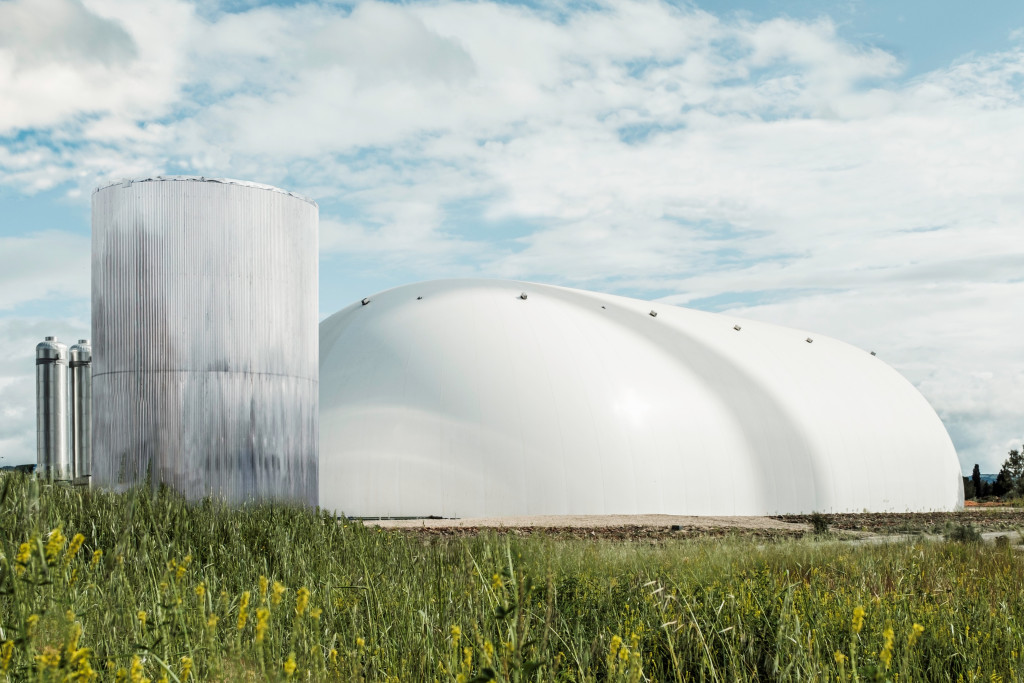With UW–Madison assist, project could accelerate nation’s clean energy transition

Energy Dome’s CO2 battery located in Sardinia, Italy. Photo courtesy of Energy Dome
University of Wisconsin–Madison engineers are supporting a first-of-its-kind energy storage system in the United States that could come online as early as 2026 in Wisconsin’s Columbia County.
The project would be the first to demonstrate — at a commercial scale — a closed-loop, carbon dioxide-based energy storage system and could validate the technology for wide-scale deployment in the United States.
Led by energy provider Alliant Energy, the new battery system, known as the Columbia Energy Storage Project, represents a significant advancement toward a more sustainable, reliable and cost-effective energy future. In September 2023, the U.S. Department of Energy Office of Clean Energy Demonstrations selected Alliant Energy for a grant of as much as $30 million to construct the 200-megawatt-hour energy storage system.
The project would use an innovative design by Energy Dome, a Milan, Italy–based energy storage solutions provider, to deliver long-duration energy storage by compressing carbon dioxide gas into a liquid. When that energy is needed, the system converts the liquid carbon dioxide back to a gas, which powers a turbine to create electricity. This highly efficient, zero-emissions battery system can power approximately 20,000 Wisconsin homes for up to 10 hours on a single charge.
“Our UW–Madison partners contributed expertise and resources that played a significant role in getting this project off the ground and securing support from the DOE,” says Michael Bremel, director of engineering and customer solutions at Alliant Energy, which is leading the project. “This project will advance the clean energy transition in Columbia County and benefit communities across Wisconsin by increasing energy reliability and resilience while also creating jobs and delivering incredible value to customers.”
The idea to pursue this project grew out of conversations between UW–Madison faculty and Alliant Energy leaders who are members of the UW–Madison Clean Energy Community Initiative, which brings together a network of industry, policy, research and community partners to co-create equitable and community-driven clean energy solutions throughout Wisconsin.
“The Clean Energy Community Initiative is a wonderful example of the Wisconsin Idea, through which the university is collaborating with Wisconsin stakeholders and leveraging its experts to deliver real-world benefits to state residents,” says Oliver Schmitz, who directs the initiative and is a nuclear engineering and engineering physics professor and associate dean for research innovation in the UW–Madison College of Engineering.
“Bringing a new technology of this scale to Wisconsin is very exciting and will create opportunities to build an economy around it here,” says Schmitz. “This technology will provide crucial storage for solar and wind energy, enabling more renewable energy use.”
Members of the initiative are leading the project’s community benefits plan — an important element of projects funded by the DOE Office of Clean Energy Demonstrations, which aims to ensure broadly shared prosperity in the clean energy transition.
They also are directly supporting the Columbia Energy Storage Project in several other ways. They are facilitating community discovery workshops, which are inclusive events designed to be two-way engagements with communities to identify the values, needs and priorities of stakeholders, especially those from underserved communities. In addition, they are creating and disseminating information about the project to the public.
Initiative leaders also are supporting workforce development. Partner institution Madison College is creating a certificate-level program to train workers in this energy storage system technology. The College of Engineering’s Interdisciplinary Professional Programs plans to offer educational opportunities for industry professionals to build their skills in this area. And College of Engineering faculty can provide technical assistance to help implement and troubleshoot the new technology.
Other partners in the energy project include WEC Energy Group, Madison Gas and Electric, Shell Global Solutions US, and the Electric Power Research Institute.
The facility will be built south of Portage, Wisconsin, in the town of Pacific, near the current Columbia Energy Center. Alliant Energy expects to submit project plans to the Wisconsin Public Service Commission in the first half of 2024. Pending approval, project construction could begin in 2025 with completion in 2026.
